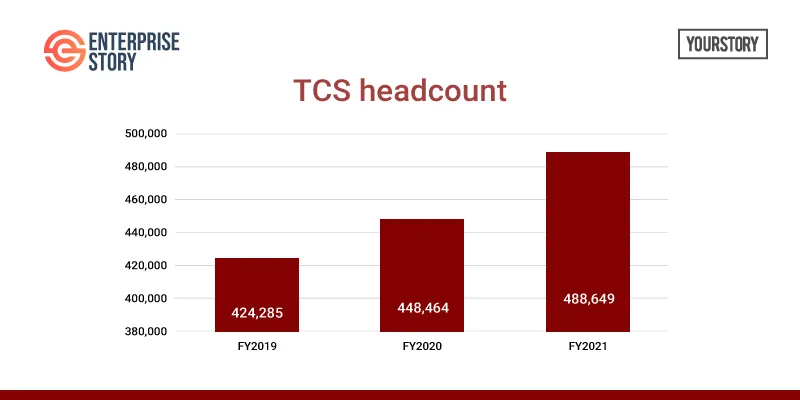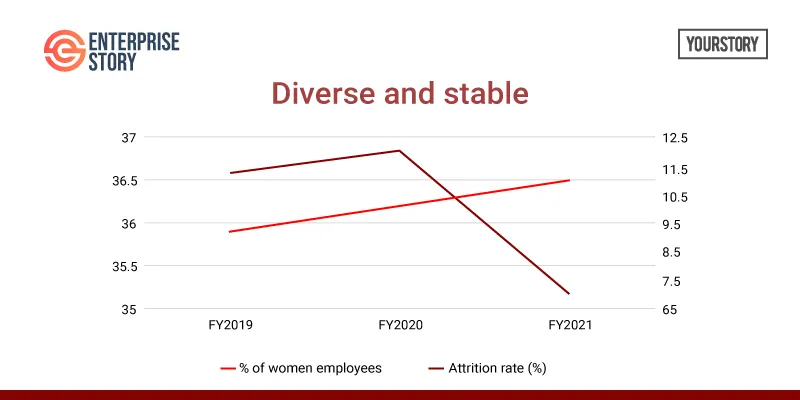How TCS made 390,000 employees location-independent and agile
In the backdrop of the pandemic, India’s largest IT exporter executed a massive workforce migration.
When the pandemic broke out in March 2020, India’s largest IT exporter TCS (Tata Consultancy Services) had a formidable task on its hands.
The $22 billion IT services company has 488,649 employees spread across 107 locations in India and 76 overseas locations. TCS needed to ensure remote and secure operations for nearly 390,000 employees in India.

TCS completed the operation in three weeks. Today, only 4 percent (or less than 20,000 employees) work from offices. It was a staggering feat for a company whose headcount will cross the half-million mark this year. It also took a new proposition to its enterprise customers: the talent cloud.
“Historically, we serviced customers from specific delivery centers, and staffed any new project largely with individuals based in those locations,” Milind Lakkad, Chief Human Resources Officer of TCS, told shareholders in its 2020-21 annual report.
“We are now using AI to autonomously match individuals with the requisite skill-profiles to open opportunities, regardless of their physical location,” Lakkad explained.
Talent Cloud is thus enabling access to a larger pool of talent, better fitment with client needs, significantly faster allocations, and superior outcomes.
In effect, a cybersecurity team is not selected by location, but by a combination of individual experts spread across India and beyond—all working from their homes. With part-allocation of such cybersecurity teams for multiple client assignments, customers get faster project ramp-ups because of TCS’ agile methodologies.
“Agile, when distributed, can be done from anywhere in the world,” says a senior manager at TCS, who requested anonymity because he is not authorised to speak to the media. “Customers have bought into this. They want the best talent, regardless of where they are. They just want the job done.”
Keeping talent location independent and agile
TCS has thrived in its training and development programmes that are focused on selecting engineering graduates, and accelerating their technology-learning cycles.
Even as the pandemic entered its second wave in April, TCS employees had logged over 43 million learning hours in FY 2021. This involved more than 379,000 employees getting trained virtually in new technologies, and over 457,000 employees in Agile methods.

The company also introduced a Contextual Masters program, which identified 16,000 employees with deep knowhow of clients’ businesses and technology contexts.
In July 2020, TCS announced its Vision 25x25 for the post-pandemic world. “We envisage that by year 2025, no more than 25 percent of our employees would need to be at a TCS facility at a point in time,” Lakkad says. “And no individual would have to spend more than 25% of their time at a TCS facility to be 100% productive.”
Focusing on mental well-being of employees
TCS’ execution of Secure Borderless Workspaces was carried out not by one or two top managers’ orders. It was pulled off by nearly 1,100 business unit heads in India, each of whom oversee 400 employees. They picked up the cues of the situation, and simply followed the business continuity plans.
The business unit heads anticipated the first lockdown in early March 2020, and coordinated with HR to get the authorisations, and enable employees to return to their hometowns, or even help them with accommodation when youngsters had trouble with landlords.
The proactiveness helped employees take their desktops home after the requisite permissions a week before the national lockdown was announced. The autonomy and enterprising leadership freed up Lakkad to focus on what would become a huge factor for employees working from home: mental well-being.
TCS extended counselling and self-help services providing mental and emotional support to employees. This was in conjunction with the medical helplines, ambulance services and first line Covid Care Centers at TCS premises.
“Working from home can be stressful, as not everybody has the same working situation or personal situation at home,” says the senior manager at TCS. “Off all the leaders, Milind (Lakkad) understands this best. He truly has empathy, and genuinely cares about people.”
As boundaries between work and home disappeared, TCS actively encouraged people to switch off and refresh. “Under Lakkad, HR has been talking about mental well-being a lot more. There have been a lot of internal communication on this front,” the senior manager says.
“Associate health and well-being has been our top priority in making all our business decisions,” Lakkad said during the March 2021 earnings call. The HR department connects one-on-one with almost every employee at least once a quarter, TCS' Chief Operating Officer NG Subramaniam added.
The Vision 25x25 will be Lakkad's legacy at TCS, not just because of the migration to TCS’ trademarked Secure Borderless Workspaces for its employees, but because of the softer touches it has entailed.






